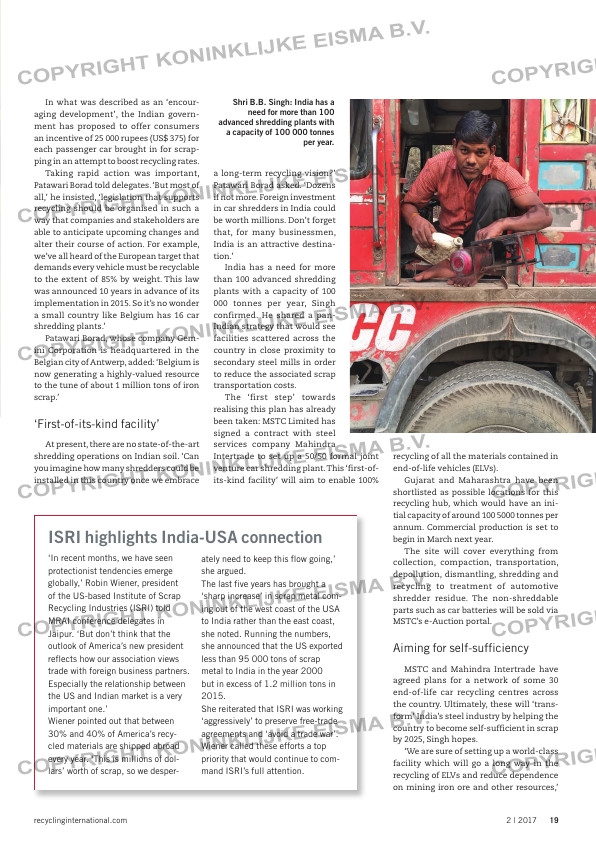Page 21 from: Edition 2 2017

192 | 2017recyclinginternational.com
In what was described as an ‘encour-
aging development’, the Indian govern-
ment has proposed to offer consumers
an incentive of 25 000 rupees (US$ 375) for
each passenger car brought in for scrap-
ping in an attempt to boost recycling rates.
Taking rapid action was important,
Patawari Borad told delegates. ‘But most of
all,’ he insisted, ‘legislation that supports
recycling should be organised in such a
way that companies and stakeholders are
able to anticipate upcoming changes and
alter their course of action. For example,
we’ve all heard of the European target that
demands every vehicle must be recyclable
to the extent of 85% by weight. This law
was announced 10 years in advance of its
implementation in 2015. So it’s no wonder
a small country like Belgium has 16 car
shredding plants.’
Patawari Borad, whose company Gem-
ini Corporation is headquartered in the
Belgian city of Antwerp, added: ‘Belgium is
now generating a highly-valued resource
to the tune of about 1 million tons of iron
scrap.’
‘First-of-its-kind facility’
At present, there are no state-of-the-art
shredding operations on Indian soil. ‘Can
you imagine how many shredders could be
installed in this country once we embrace
a long-term recycling vision?’
Patawari Borad asked. ‘Dozens
if not more. Foreign investment
in car shredders in India could
be worth millions. Don’t forget
that, for many businessmen,
India is an attractive destina-
tion.’
India has a need for more
than 100 advanced shredding
plants with a capacity of 100
000 tonnes per year, Singh
confirmed. He shared a pan-
Indian strategy that would see
facilities scattered across the
country in close proximity to
secondary steel mills in order
to reduce the associated scrap
transportation costs.
The ‘first step’ towards
realising this plan has already
been taken: MSTC Limited has
signed a contract with steel
services company Mahindra
Intertrade to set up a 50/50 formal joint
venture car shredding plant. This ‘first-of-
its-kind facility’ will aim to enable 100%
recycling of all the materials contained in
end-of-life vehicles (ELVs).
Gujarat and Maharashtra have been
shortlisted as possible locations for this
recycling hub, which would have an ini-
tial capacity of around 100 5000 tonnes per
annum. Commercial production is set to
begin in March next year.
The site will cover everything from
collection, compaction, transportation,
depollution, dismantling, shredding and
recycling to treatment of automotive
shredder residue. The non-shreddable
parts such as car batteries will be sold via
MSTC’s e-Auction portal.
Aiming for self-sufficiency
MSTC and Mahindra Intertrade have
agreed plans for a network of some 30
end-of-life car recycling centres across
the country. Ultimately, these will ‘trans-
form’ India’s steel industry by helping the
country to become self-sufficient in scrap
by 2025, Singh hopes.
‘We are sure of setting up a world-class
facility which will go a long way in the
recycling of ELVs and reduce dependence
on mining iron ore and other resources,’
ISRI highlights India-USA connection
‘In recent months, we have seen
protectionist tendencies emerge
globally,’ Robin Wiener, president
of the US-based Institute of Scrap
Recycling Industries (ISRI) told
MRAI conference delegates in
Jaipur. ‘But don’t think that the
outlook of America’s new president
reflects how our association views
trade with foreign business partners.
Especially the relationship between
the US and Indian market is a very
important one.’
Wiener pointed out that between
30% and 40% of America’s recy-
cled materials are shipped abroad
every year. ‘This is millions of dol-
lars’ worth of scrap, so we desper-
ately need to keep this flow going,’
she argued.
The last five years has brought a
‘sharp increase’ in scrap metal com-
ing out of the west coast of the USA
to India rather than the east coast,
she noted. Running the numbers,
she announced that the US exported
less than 95 000 tons of scrap
metal to India in the year 2000
but in excess of 1.2 million tons in
2015.
She reiterated that ISRI was working
‘aggressively’ to preserve free-trade
agreements and ‘avoid a trade war’.
Wiener called these efforts a top
priority that would continue to com-
mand ISRI’s full attention.
Shri B.B. Singh: India has a
need for more than 100
advanced shredding plants with
a capacity of 100 000 tonnes
per year.



